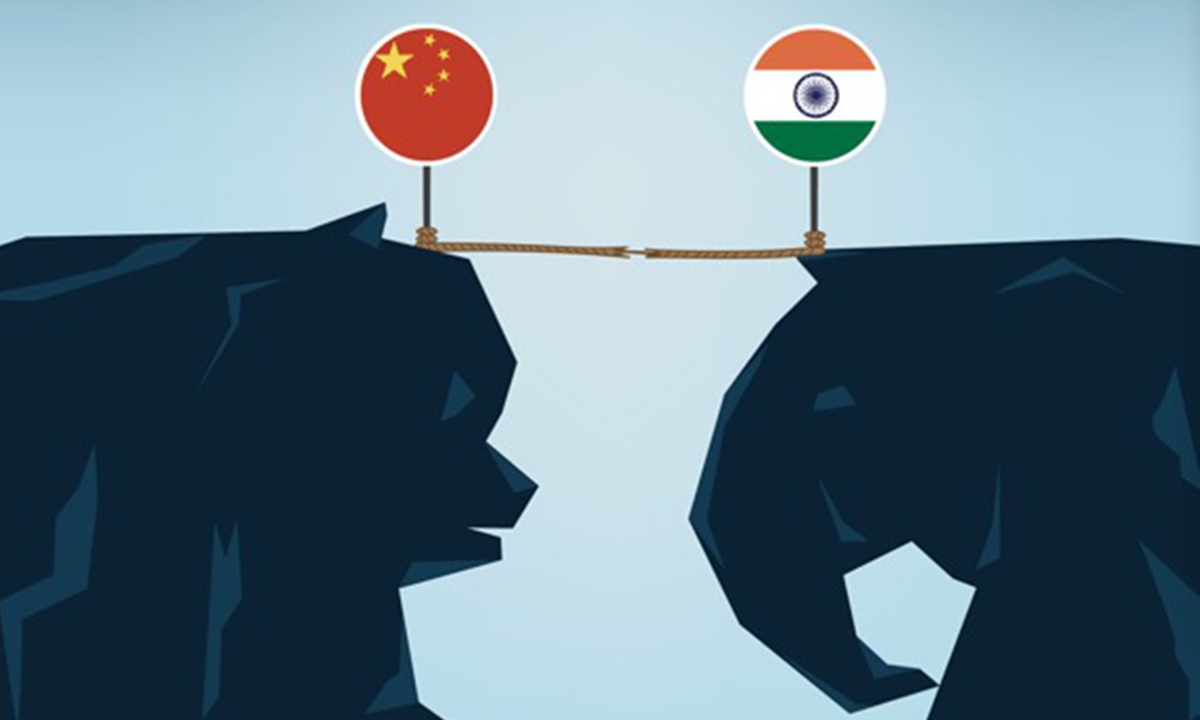Economic meltdown, border tensions pummel India's Modi
By Wen Sheng Source: Global Times Published: 2020/9/2 18:03:27

Illustration: GT
India's economy tanked from April to June by a whopping 23.9 percent, recording the steepest contraction among the world's G20 countries, reflecting years of uneven development and the country's fragile economic structure that melted down instantly under the impact of the COVID-19 onslaught.
Indian Prime Minister Narendra Modi is facing mounting pressure as the current fiscal year is expected to see a drastic GDP contraction of at least 10 percent, as estimated by the economists based in India and abroad. Tens of millions of Indians are expected to return to poverty.
And, Modi's hope to win his third term in 2024 is getting dimmer, as many Indian businesses and jobs are being wiped out permanently, and at the same time, the coronavirus pandemic is raging anew in the most populous country in South Asia, dealing a blow to any hope of an instant recovery.
According to India's statistics and information ministry, the worst battered segments of Indian economy in the second quarter are construction sector, which halved 50 percent from last year; manufacturing industry, which shed 39 percent, and mining sector, which evaporated 23 percent. Because of the widespread lockdowns, the data quality is deemed sub-optimal, and most economists expect the situation to be worse when the data is revised in due course.
While there are some signs that economic activity began picking up in July and August as lockdown restrictions were eased, the recovery has been uncertain as India is quickly becoming the new global epicenter of coronavirus infections. Now, the country reports an average of more than 60,000 new cases per day.
Indian economy is heavily dependent on domestic consumption and exports. As a majority of Indians have earned less or lost jobs because of the virus outbreak, their spending power has dwindled. And, overseas market appetite for Indian goods and services has dropped too.
To make things worse, New Delhi has lately unwisely provoked a new border brawl with China, conniving Indian troops to trespass the LAC (line of actual control) and enter China's side.
The ill-intended maneuver will exacerbate the already frayed bilateral relations, and effectively drive away Chinese investments from India. Alibaba Group has already halted all new investments, vowing to slash jobs and scale down its operations in India, shortly. It is believed that more Chinese companies will follow and cut down their Indian businesses to reduce their exposure to risks in India.
Following the bloody Galwan Valley border clash on June 15, New Delhi announced to ban 59 Chinese app services in India. The move has fundamentally shaken the previously brisk economic cooperation between the two large countries.
The worsening relations with China, which was somehow engineered by New Delhi to deflect its failure to contain the coronavirus spread, is expected to give the already faltering Indian economy another battering, as China's huge market will gradually close to Indian goods and services due to the rising border tensions.
And, from the perspective of geo-economics, it's utterly silly for New Delhi not to nurture a good relationship with China, whose economy is more than five times that of India and is still growing. As a neighbor of China, it is foolish not to align with Asia's largest economy as Beijing had more than once extended a friendly hand to New Delhi which chose to neglect.
A souring relationship with China will prove to be the most distressful thing for India in the coming months and years, because India can never move away from the giant and increasingly powerful neighbor.
Just a few years ago, India, with a population of 1.3 billion people, was one of the world's fastest-growing large economies, clocking growth of 7 percent or higher. But the economy had begun to slow down since 2017. For example, car sales plunged 33 percent in August last year, the largest drop in two decades.
And, Indian government's finances are over stretched. In other words, it has been borrowing more than what it should have. If Covid-19 pandemic is not controlled and the public health crisis drags on to 2021, the country, stuck in an unprecedented economic recession, will face the double whammy of rising domestic and foreign debt repayments. The challenges before Prime Minister Modi are rising now.
The author is an editor with the Global Times. bizopinion@globaltimes.com.cn
Posted in: EXPERT ASSESSMENT